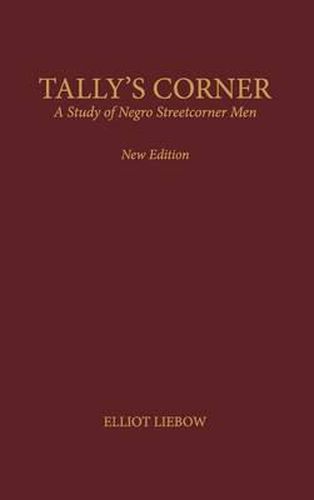Readings Newsletter
Become a Readings Member to make your shopping experience even easier.
Sign in or sign up for free!
You’re not far away from qualifying for FREE standard shipping within Australia
You’ve qualified for FREE standard shipping within Australia
The cart is loading…






This is a reponse to the culture of poverty thesis - that the poor are different and, according to conservatives, morally inferior - and alternative explanations that many African Americans are caught in a tangle of pathology owing to the absence of black men in families. Liebow’s shadow theory of values - especially the values of poor, urban, black men - remains the single most parsimonious account of the reasons why the behaviou of the poor appears to be at odds with the values of the American mainstream. While elliot Liebbow’s narrative of street-corner black men remains unchanged, the new introductions to this revised edition bring the book up-to-date. Wilson and Lemert describe the debates since 1965 and situate Liebow’s text in respect to current theories of urban poverty and race. They account for what Liebow might have seen had he studied the street corner today after welfare has been virtually ended and the drug economy had taken its toll. They also take stock of how the new global economy is a source of added strain on the urban poor. Discussion of field methods since the 1960s rounds out the book’s new coverage.
$9.00 standard shipping within Australia
FREE standard shipping within Australia for orders over $100.00
Express & International shipping calculated at checkout
This is a reponse to the culture of poverty thesis - that the poor are different and, according to conservatives, morally inferior - and alternative explanations that many African Americans are caught in a tangle of pathology owing to the absence of black men in families. Liebow’s shadow theory of values - especially the values of poor, urban, black men - remains the single most parsimonious account of the reasons why the behaviou of the poor appears to be at odds with the values of the American mainstream. While elliot Liebbow’s narrative of street-corner black men remains unchanged, the new introductions to this revised edition bring the book up-to-date. Wilson and Lemert describe the debates since 1965 and situate Liebow’s text in respect to current theories of urban poverty and race. They account for what Liebow might have seen had he studied the street corner today after welfare has been virtually ended and the drug economy had taken its toll. They also take stock of how the new global economy is a source of added strain on the urban poor. Discussion of field methods since the 1960s rounds out the book’s new coverage.